Key takeaways
- Socratic questioning encourages curiosity and critical thinking, transforming learners from passive recipients to active thinkers.
- The method fosters a safe and open classroom environment, where mistakes are embraced and inquiry is shared among students.
- Effective Socratic questioning involves preparing open-ended questions, allowing for pauses to enhance reflection, and maintaining a tone of genuine curiosity.
- Reflecting on the process reveals that true learning often occurs through exploration rather than seeking immediate answers.
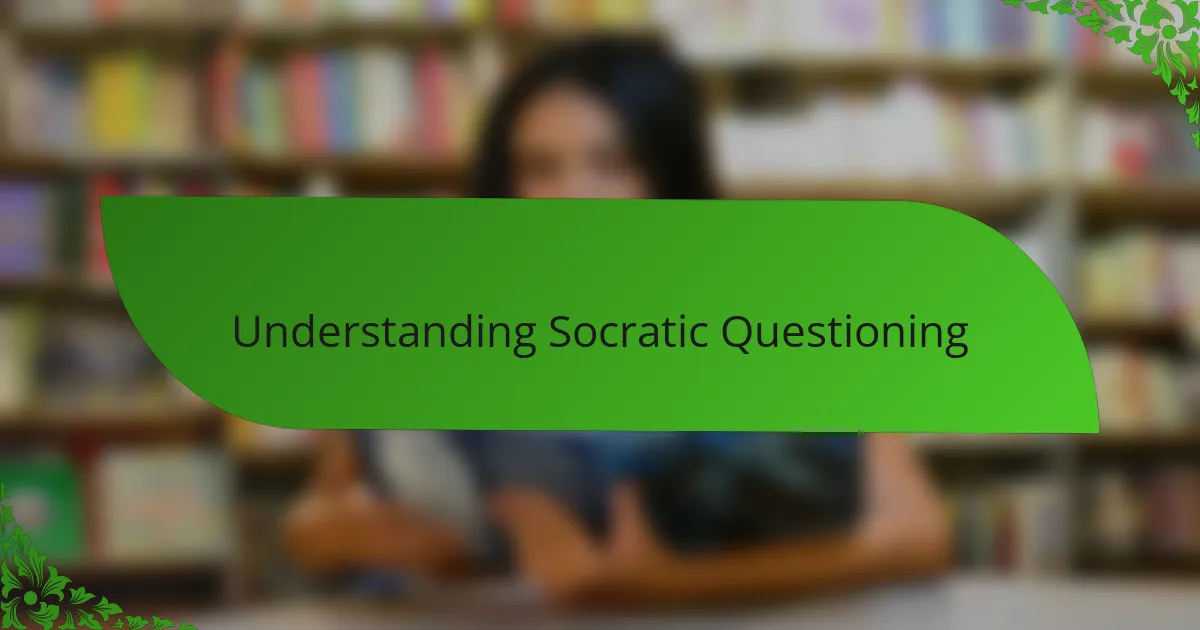
Understanding Socratic Questioning
When I first encountered Socratic questioning, I was struck by its simplicity—and its power. It’s not about grilling someone with tough questions but about genuinely diving deeper into ideas by asking thoughtful, open-ended questions. Have you ever noticed how a single well-placed question can open up a whole new way of thinking? That’s the essence of Socratic questioning.
What appeals to me most is how this method encourages curiosity rather than judgment. Instead of assuming you know the answer, you explore the layers beneath someone’s statement, gently challenging assumptions and encouraging reflection. I remember conversations where this approach turned confusion into clarity, simply because the questions led us to reconsider what we thought we understood.
Socratic questioning isn’t just a teaching tool—it’s a way to engage with the world thoughtfully. It invites us to slow down, challenge certainty, and embrace the unknown. When I practice it, I often find myself not just helping others see differently, but also reshaping my own perspective in surprising ways. Isn’t that what true learning is all about?
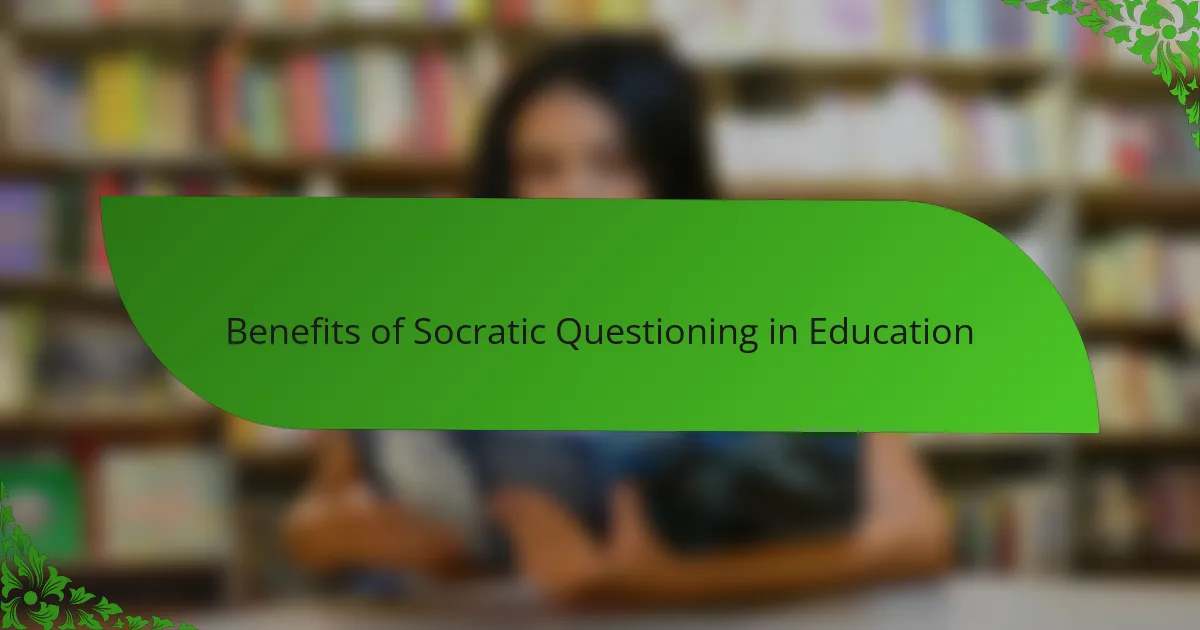
Benefits of Socratic Questioning in Education
What truly stands out to me about Socratic questioning in education is how it turns students from passive recipients into active thinkers. When I’ve seen learners engage with carefully crafted questions, their confidence to explore and articulate ideas grows visibly. Isn’t that shift—from memorizing answers to discovering understanding—exactly what education should foster?
I’ve noticed that this approach also nurtures critical thinking by encouraging students to challenge assumptions, including their own. For instance, I once guided a student who was initially convinced about a topic until a single question made them reconsider the basis of their beliefs. Moments like that remind me how powerful questioning is in developing intellectual humility.
Finally, Socratic questioning cultivates a classroom atmosphere where curiosity thrives and mistakes aren’t feared but embraced. I recall sessions where students eagerly asked questions of one another, creating a lively dialogue rather than a one-way lecture. Doesn’t learning become so much richer when it’s a shared journey of inquiry rather than a test of knowledge?
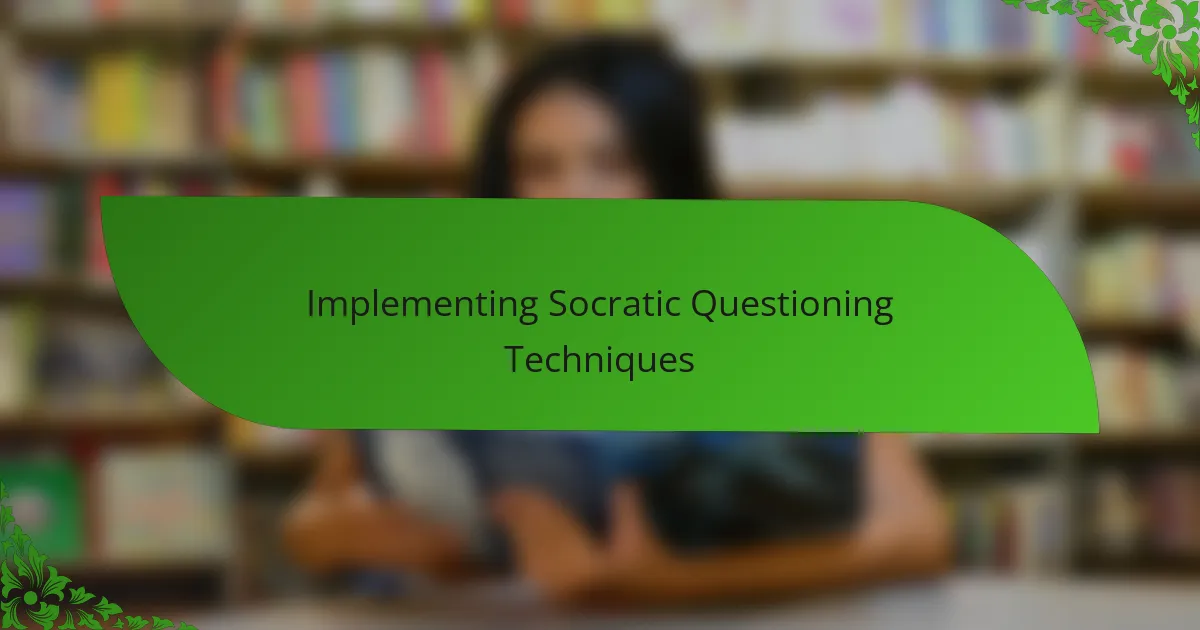
Implementing Socratic Questioning Techniques
When I started implementing Socratic questioning techniques, I found it essential to focus on open-ended questions that invite reflection rather than quick answers. For example, instead of asking, “Is this fact true?” I would ask, “What evidence supports this idea?” This small shift transformed conversations from simple Q&A sessions into meaningful explorations.
One moment that stands out to me was during a seminar where I deliberately paused after each question to really listen. It was surprising how giving space for silence encouraged deeper thought and more thoughtful responses. Have you ever experienced how pausing can actually improve the quality of a conversation? I certainly have—it’s like opening a door to possibilities that might otherwise remain closed.
I also learned that maintaining a genuine curiosity is key when implementing this method. If the questioner’s tone conveys judgment, the dialogue quickly shuts down. Instead, I’ve found that expressing authentic interest and sometimes admitting my own uncertainties invites others to open up more freely. This mutual vulnerability turns questioning into a shared journey rather than a test of knowledge.
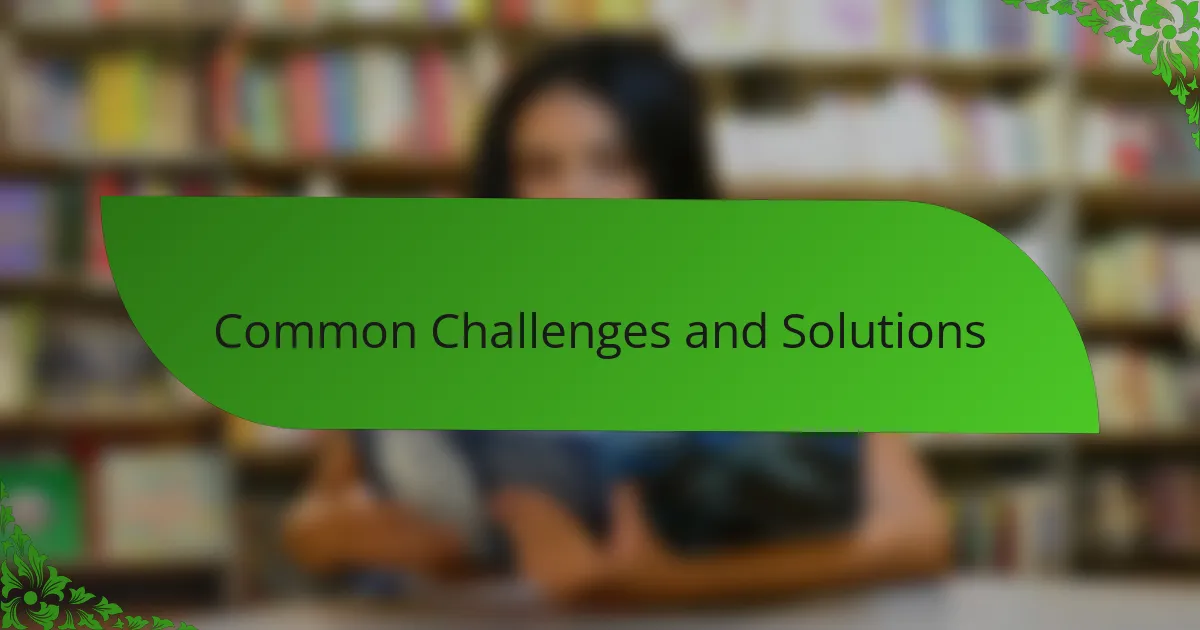
Common Challenges and Solutions
One challenge I faced early on was the temptation to rush through questions, eager to get to a “correct” conclusion. Have you ever felt that pressure? Slowing down and embracing the pause felt awkward at first, but it made all the difference—allowing thoughts to unfold naturally instead of forcing premature answers.
Another difficulty emerged when I noticed some participants shutting down, fearing their ideas would be judged. This reminded me how important it is to create a safe space. I started explicitly encouraging curiosity and reminding everyone that uncertainty isn’t a flaw but an opportunity. That shift in atmosphere brought a refreshing openness to our discussions.
At times, I struggled with keeping my questions genuinely open-ended without slipping into leading or yes/no formats. It took practice to frame questions that invite exploration rather than simply steering the conversation. When I succeeded, the dialogue blossomed, showing me how essential careful question-crafting really is to the process.
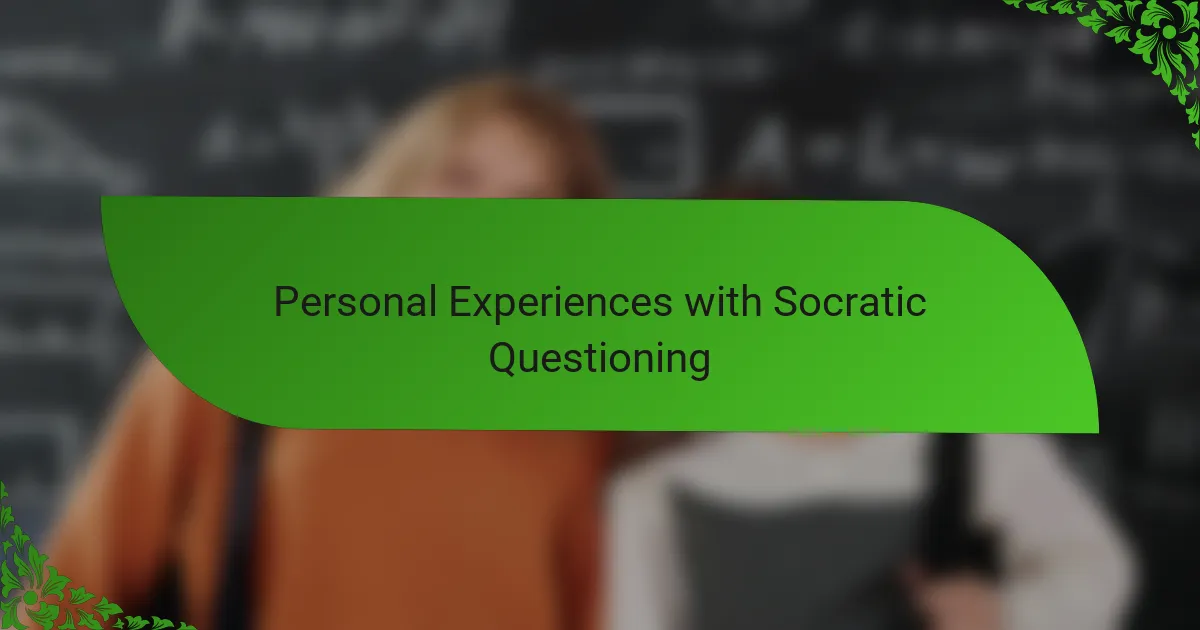
Personal Experiences with Socratic Questioning
I vividly recall a time when, during a study group, a simple Socratic question completely shifted the direction of our conversation. Instead of accepting the textbook explanation, I asked, “Why do we believe this to be true?” That moment sparked such curiosity among us that we ended up digging far deeper than expected. It felt exhilarating—like peeling back layers to reveal hidden insights.
There was also a personal instance when I used Socratic questioning to better understand a friend’s perspective on a complex issue. Rather than jumping in with my opinions, I leaned into asking questions like, “What experiences led you to that view?” This approach not only deepened our dialogue but strengthened our connection. Have you ever noticed how genuine inquiry can build bridges rather than walls?
Sometimes, I’ve stumbled when trying to balance guiding the conversation and letting it flow naturally. I remember feeling frustrated when my questions unintentionally narrowed the discussion instead of opening it up. Over time, I’ve learned that embracing uncertainty and letting silence do some of the work invites others to explore their own thoughts more freely. Isn’t that a powerful lesson in humility and patience?
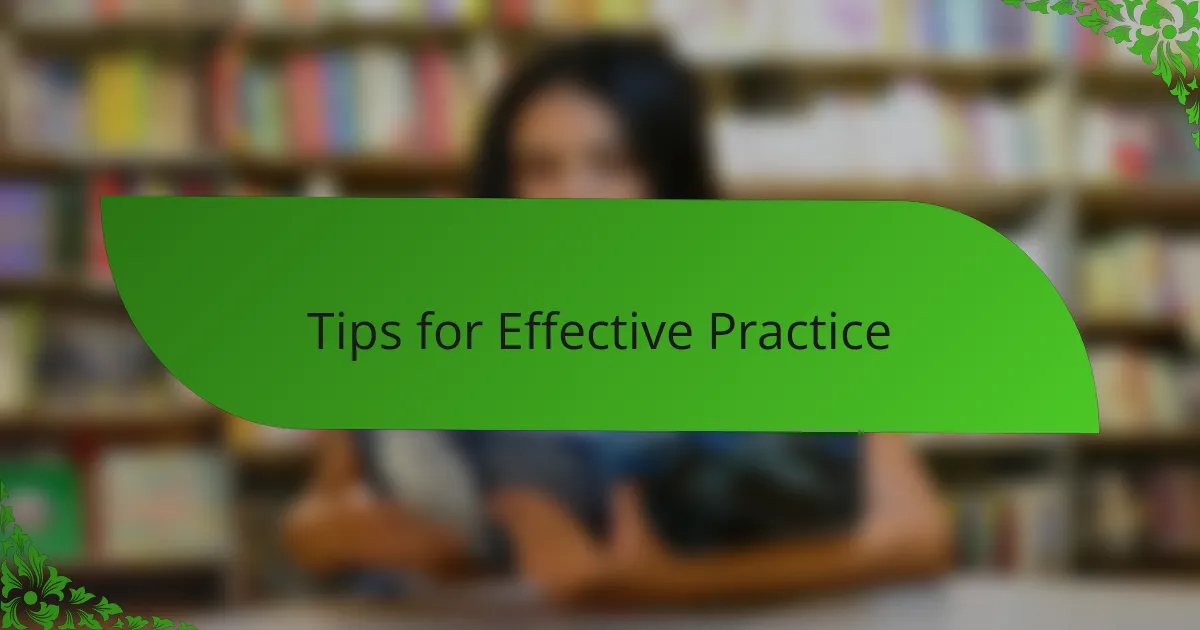
Tips for Effective Practice
When practicing Socratic questioning, I found that preparing questions beforehand helps keep the dialogue focused but still flexible. It’s a delicate balance—too rigid, and the conversation stalls; too loose, and it wanders aimlessly. Have you ever noticed how a well-timed question can pivot the whole discussion? I have, and it’s always thrilling to see where it leads.
Another tip that worked wonders for me was embracing silence after asking a question. At first, those pauses felt uncomfortable, but over time, I realized they’re essential. They give both me and others the space to think deeply, rather than rushing to fill the quiet. Isn’t it interesting how something as simple as silence can invite richer insights?
Lastly, I’ve learned to check my tone carefully. Genuine curiosity, rather than judgment, invites openness. When I’m sincere about not knowing and eager to understand, participants seem more willing to share honestly. Doesn’t it feel better when a conversation is a shared exploration rather than a test? That mindset completely transformed my approach to Socratic questioning.
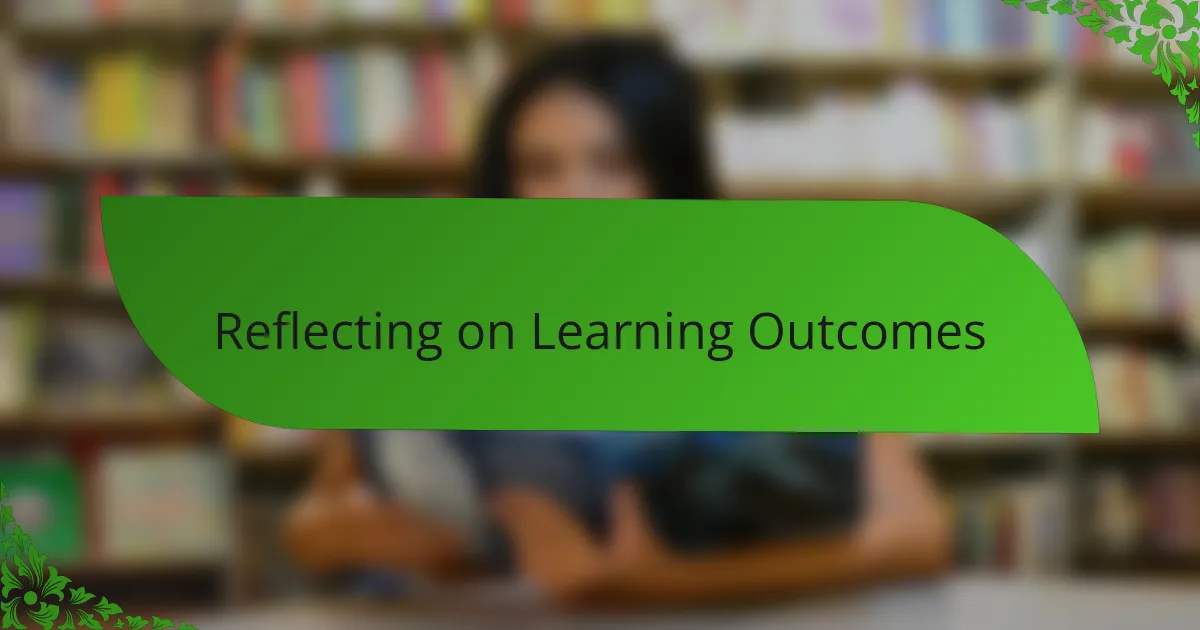
Reflecting on Learning Outcomes
Reflecting on the learning outcomes of Socratic questioning, I realize how much this method reshaped not only my thinking but also my approach to dialogue. Each session left me more aware of how questions can uncover hidden assumptions and prompt deeper understanding. Have you ever been surprised by what a simple question revealed about your own beliefs? I certainly have, and it’s a humbling experience.
What struck me most was the way Socratic questioning cultivated patience and openness in both myself and others. I recall moments when lingering in silence after a question felt uncomfortable at first, but then gave space for profound insight to emerge. It made me appreciate that genuine learning often unfolds slowly, rather than in quick answers.
Ultimately, reflecting on these outcomes reminds me that the value lies not in finding ‘the’ answer but in nurturing a mindset of inquiry. When I focus less on conclusions and more on exploration, conversations become richer and more meaningful. Don’t you think that embracing uncertainty is where true intellectual growth begins? For me, that shift has been transformative.